
Enterprise AI is reshaping how businesses operate, offering tools to analyze data, predict outcomes, and improve processes. This article reviews eight leading AI platforms tailored for enterprises, highlighting their features, security, and pricing. Here's what you need to know:
These platforms differ in focus, from cost savings and compliance to knowledge management and workflow automation. Below is a quick comparison for easier decision-making.
| Platform | Key Feature | Pricing | Best For |
|---|---|---|---|
| Prompts.ai | AI orchestration of 35+ models | From $99/user/month | Multi-model management, cost control |
| Sana Agents | Data organization and compliance | Usage-based | Legal, HR, and compliance teams |
| Microsoft Copilot | AI in Microsoft 365 tools | Included in 365 pricing | Office productivity |
| Glean | Unified search and document AI | Custom | Knowledge workers |
| Asana AI Studio | AI for project management | Not disclosed | Team collaboration |
| Domo | Cloud-based analytics | Subscription-based | Data-driven decision-making |
| ServiceNow AI Platform | IT and customer service automation | Custom | ITSM and CSM |
| Workato | Low-code workflow automation | Not disclosed | Simplifying integrations |
Choose a platform that aligns with your business needs, whether it's managing AI tools, automating workflows, or improving decision-making. Each solution offers unique strengths for specific industries and goals.
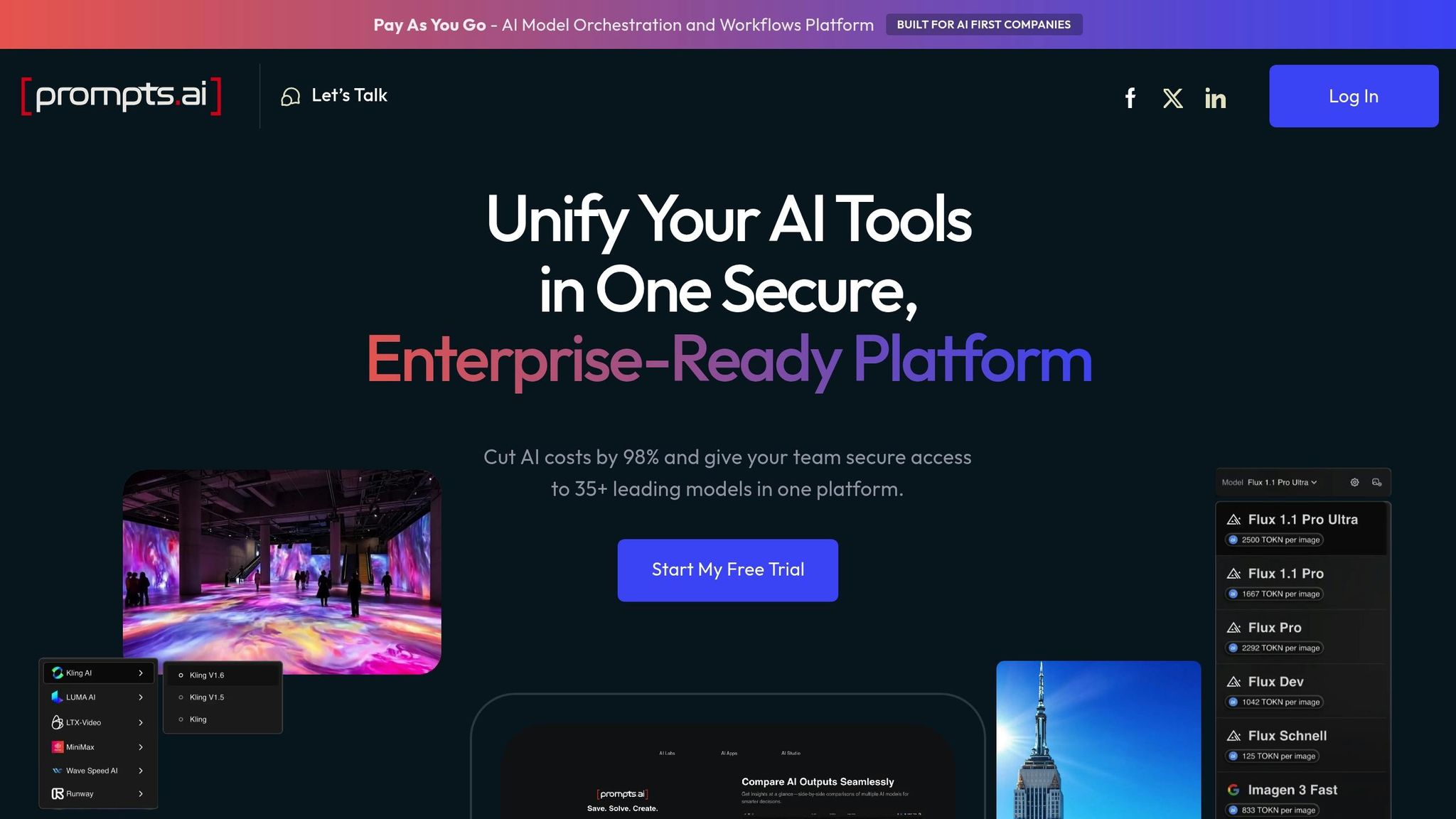
Prompts.ai is a robust orchestration platform designed for enterprises, bringing together over 35 leading large language models (such as GPT-5, Claude, LLaMA, and Gemini) within a secure, unified interface. It addresses a major challenge for U.S. businesses: managing a growing number of AI tools across departments while maintaining security, compliance, and cost efficiency.
What makes Prompts.ai stand out is its ability to simplify operations by consolidating tools and ensuring enterprise-grade governance. With access to top AI models through a single platform, companies can reduce complexity while maintaining consistent security standards. The platform caters to both non-technical users with no-code tools and developers with SDK options, making it versatile for organizations of all technical capacities. This centralized approach promotes seamless integration, strong security, and predictable costs.
Prompts.ai’s unified interface extends its strength with powerful integration and scalability features. Its API framework and prebuilt connectors link with major enterprise tools like Slack, Gmail, and Trello, enabling automated workflows across departments. The platform’s scalable infrastructure allows businesses to expand effortlessly without creating operational bottlenecks.
New models, users, or teams can be added instantly, with the system managing large data volumes and users while maintaining performance across distributed environments. For global enterprises, Prompts.ai supports multi-cloud deployment, providing flexibility and redundancy without locking organizations into a single cloud provider. This adaptability ensures reliability for critical operations.
Security is a cornerstone of Prompts.ai, which adheres to industry standards like SOC 2 Type II, HIPAA, and GDPR. The SOC 2 Type II audit, completed on June 19, 2025, underscores its commitment to rigorous security protocols.
The platform offers features such as data encryption, role-based access control (RBAC), and detailed audit logs to safeguard sensitive business data. Through its Trust Center, organizations can monitor their security posture in real-time, with visibility into policies, controls, and compliance progress.
For industries with strict regulatory demands, such as finance and healthcare, Prompts.ai provides customizable settings to meet specific compliance requirements. Its audit-ready governance tools make it an excellent fit for businesses operating under tight regulatory frameworks.
Unpredictable costs are a common hurdle in enterprise AI adoption, and Prompts.ai tackles this head-on with clear, straightforward pricing. The platform provides detailed cost breakdowns, helping organizations budget and forecast accurately. Its built-in FinOps layer tracks token usage, allowing businesses to tie AI spending directly to outcomes.
The pay-as-you-go TOKN credit system replaces traditional subscription fees with usage-based costs, potentially cutting AI software expenses by up to 98%. This transparency helps businesses align their spending with operational goals.
Pricing starts at $99 per user per month for the Core plan, with Pro and Elite tiers priced at $119 and $129, respectively. All plans include unlimited workspaces and collaborators, making them economical for large teams. Custom pricing options are also available for organizations with extensive needs, ensuring they only pay for the features they use.
Prompts.ai has proven its value across various industries:
These examples highlight how Prompts.ai streamlines operations, ensures compliance, and helps control costs across diverse sectors.
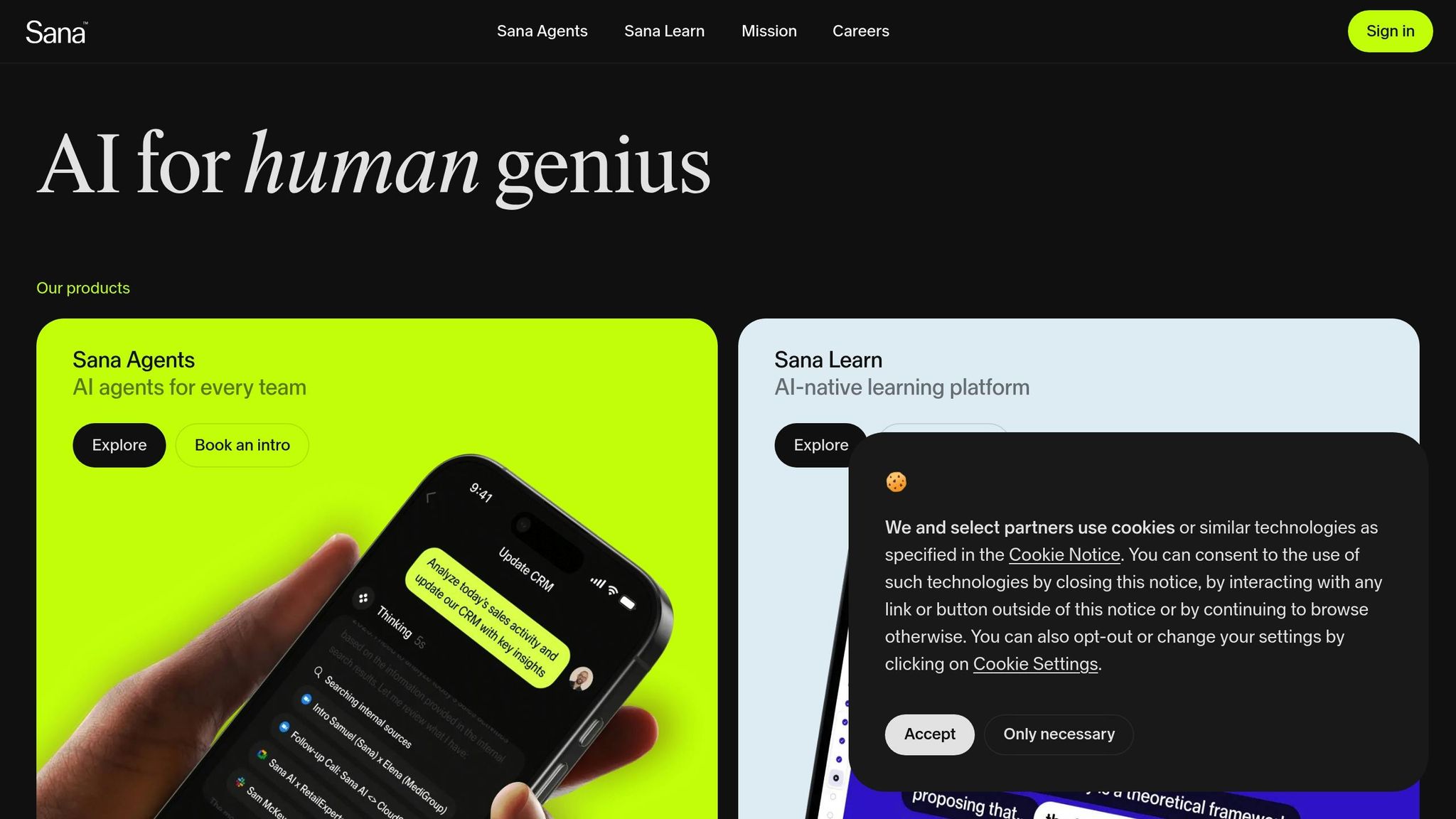
Sana Agents represents a step forward in enterprise AI, offering a platform designed to manage and organize critical business data. By leveraging natural language processing and advanced document analysis, it breaks down data silos, making essential insights easily accessible to decision-makers. Much like Prompts.ai, Sana Agents streamlines enterprise workflows by bringing key functionalities together in one cohesive platform.
Built with an API-first approach, Sana Agents seamlessly integrates with existing enterprise systems and workflows. Its design ensures it can grow alongside organizational needs, accommodating multi-department deployments and managing varying data volumes. Deployment options are flexible, offering both cloud-based and hybrid configurations to suit different operational requirements.
Security is a cornerstone of Sana Agents. It uses advanced access controls and encryption protocols to safeguard data during processing and storage. Additionally, its audit tools provide oversight capabilities, helping organizations maintain compliance with regulatory standards and address data residency concerns effectively.
Sana Agents takes a usage-based pricing approach, ensuring costs align with the specific needs of an enterprise. Built-in analytics tools allow businesses to track usage patterns and understand how their AI investments contribute to operational gains, offering a clear view of the return on investment.
Sana Agents supports a wide range of business functions, driving efficiency and informed decision-making across departments. Legal and compliance teams can expedite document reviews, human resources can streamline onboarding and share policies, sales teams can uncover actionable insights from customer data, and research and development units can analyze technical and market information to fuel progress.

Microsoft Copilot integrates AI directly into Microsoft 365, transforming familiar tools like Word, Excel, PowerPoint, and Outlook into smarter, more efficient workspaces. With natural language capabilities, users can easily request summaries of documents and emails, streamlining the process of gathering critical information - all without the need to learn a new platform.
Because Copilot is built into Microsoft 365, it seamlessly integrates with existing workflows. This ensures users can leverage AI features without disrupting their current processes.
Security is at the heart of Microsoft Copilot. It adheres to established compliance frameworks like HIPAA and GDPR, while offering robust access controls within the Microsoft 365 ecosystem. Powered by Azure's advanced security features, Copilot helps protect sensitive data and ensures a secure environment for adopting AI. These safeguards make it an ideal choice for enterprises looking to enhance productivity without compromising on security.
Microsoft Copilot simplifies tasks like summarizing documents and emails, allowing executives and team leaders to quickly review critical communications and make informed decisions.
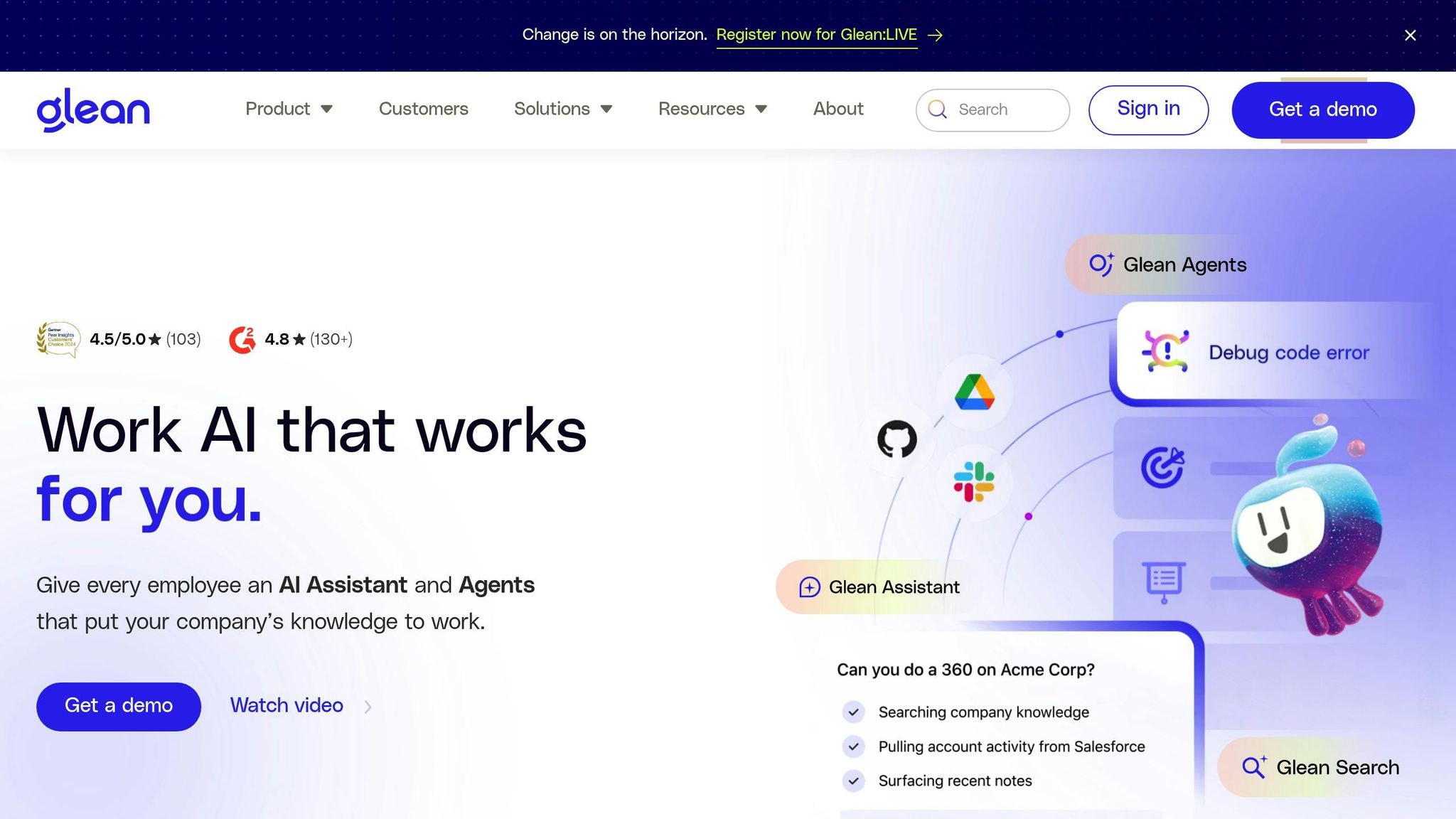
Glean reshapes how companies manage knowledge discovery by offering a centralized AI platform that connects and interprets data from various systems. Instead of juggling multiple searches across different tools, employees can access all relevant information through a single, unified search experience. This streamlined approach simplifies workflows and enhances overall efficiency in enterprise operations.
The platform's Document AI feature automates data extraction and classification, cutting down on manual data entry while improving accuracy. But Glean goes beyond document processing - its Generative AI capabilities empower businesses to create custom applications that handle repetitive tasks like answering FAQs or managing IT support tickets.
Glean connects data from different sources, making sense of complex systems without requiring a complete overhaul of existing infrastructure. This integration powers advanced search capabilities, automation, and AI-driven workflows across an organization's entire data environment.
With its generative AI tools, Glean simplifies routine tasks, such as responding to common questions or handling IT requests, all while maintaining compatibility with current systems.
Security is a cornerstone of Glean’s design. The platform includes sensitive data discovery tools that automatically identify and safeguard critical information.
Glean also ensures compliance with major data protection laws like GDPR and CCPA, enabling enterprises to meet regulatory requirements while maintaining control over data access. Administrators can review and manage user permissions, ensuring that only authorized personnel can access specific information or AI functionalities. These measures create a secure, scalable environment that grows with the organization while staying aligned with compliance standards.
Glean enhances operational efficiency by combining advanced search functionality with automation for routine tasks. Its Document AI capability processes large volumes of documents, extracting and categorizing information to reduce manual workloads and improve data accuracy.
The platform also supports the creation of custom generative AI applications tailored to unique business needs. These tools can be quickly deployed to improve internal communication workflows, streamline content creation, and speed up response times for both internal and external queries.
For knowledge workers, Glean’s unified search functionality is a game-changer. By pulling relevant information from across an organization’s data ecosystem, the platform eliminates the hassle of searching through multiple applications. The result? Faster decision-making and a noticeable boost in productivity.
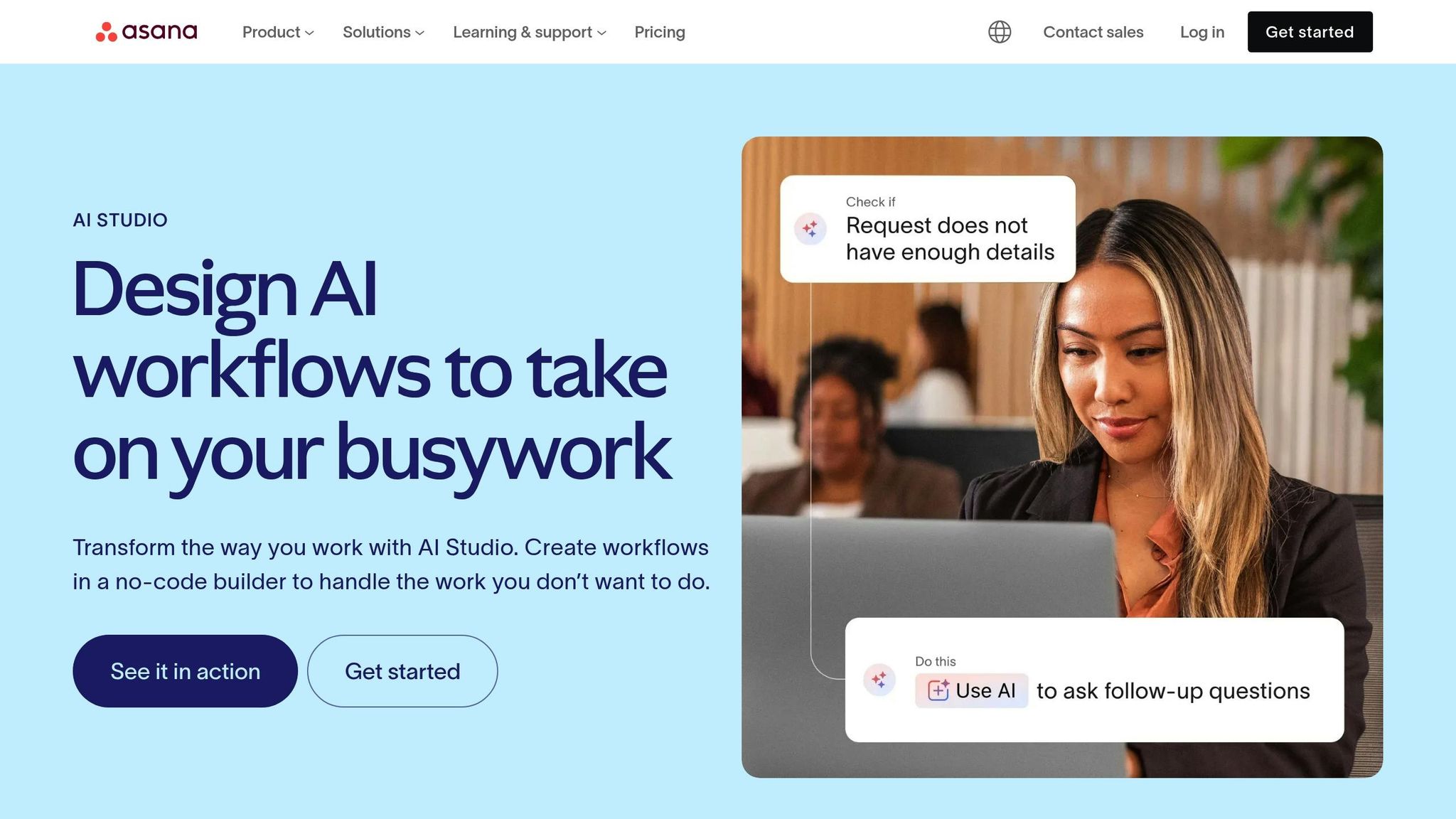
Asana AI Studio brings the power of artificial intelligence to project management, targeting enterprise teams looking for more streamlined and efficient operations. While the specifics of its features are not widely disclosed, its primary objective appears to align with the broader needs of enterprises: secure and effective AI-driven management solutions. Like other top-tier tools in this space, Asana AI Studio focuses on simplifying workflows and supporting better decision-making. However, details surrounding its integration capabilities and scalability remain limited at this time.
Research highlights that organizations are now grappling with an average of four AI-related risks, with 51% reporting at least one negative impact from AI implementation. These statistics underscore the importance of evaluating how Asana AI Studio addresses key security concerns. Enterprises need clarity on its data management protocols, governance frameworks, and oversight features to ensure it complies with both operational demands and regulatory standards.
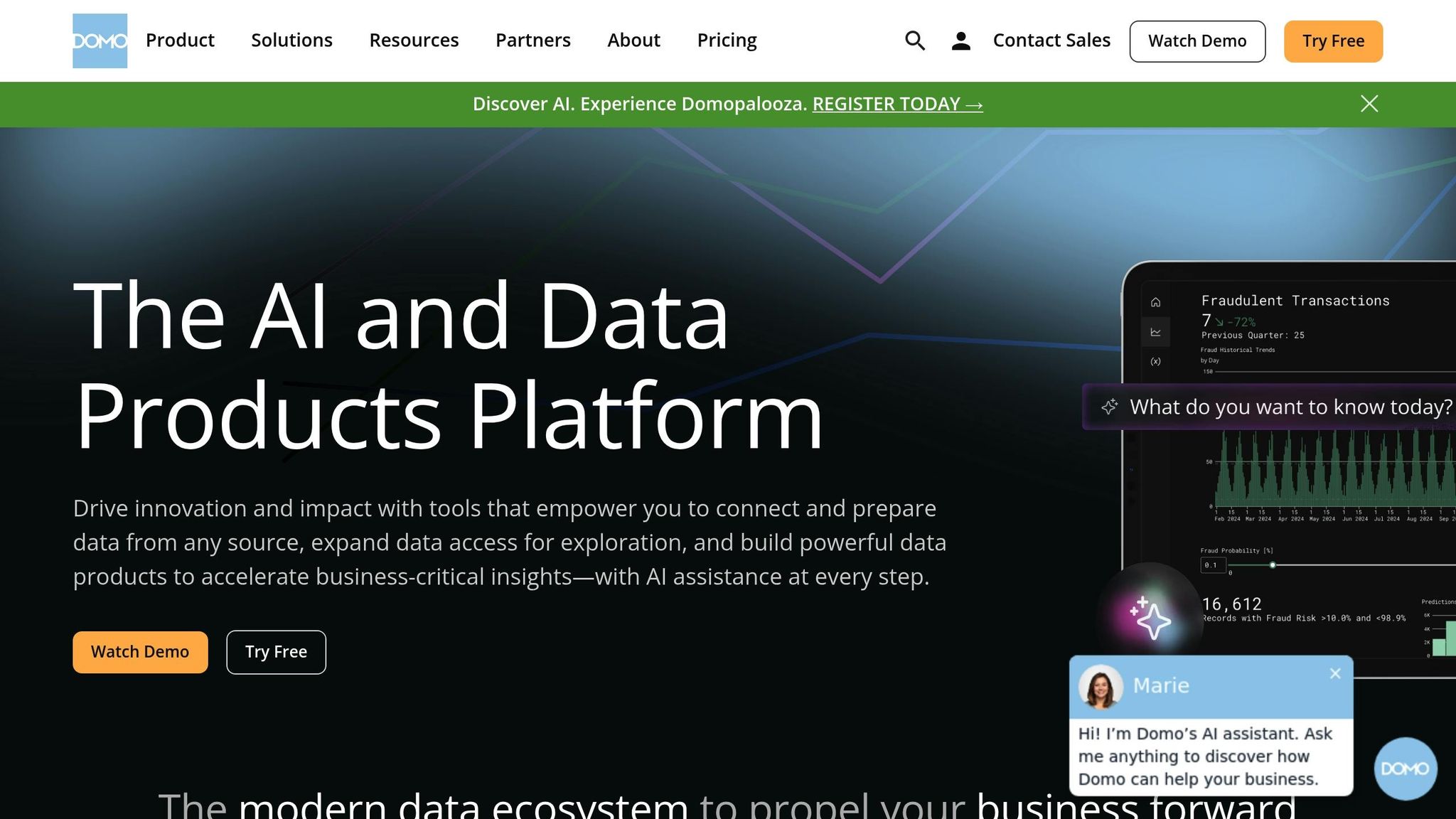
Domo is a cloud-based business intelligence platform designed to bring together data from traditional databases and modern cloud applications into one cohesive analytics environment. Its cloud-first approach ensures smooth integration and easy scalability for businesses of all sizes.
Domo offers a wide range of pre-built connectors that simplify the process of integrating data from various sources. These connectors minimize the need for custom development, saving time and resources. With its cloud-first infrastructure, businesses can start small with their analytics solutions and gradually scale up as their needs evolve, avoiding the complexities of on-premises setups.
Domo serves a variety of industries by turning raw data into actionable insights. For example, manufacturers can use its advanced analytics to improve supply chain planning, while financial institutions can monitor transactions in real time to detect unusual patterns. Retailers benefit from Domo by analyzing customer behavior to refine their marketing strategies and enhance customer engagement.
Domo operates on a subscription-based pricing model, tailored to different user roles. Pricing tiers range from basic dashboard access to more advanced analytics capabilities, including data storage and processing options.
Domo’s AI-driven, cloud-native platform provides businesses with the tools they need to modernize their analytics processes and make more informed, strategic decisions.
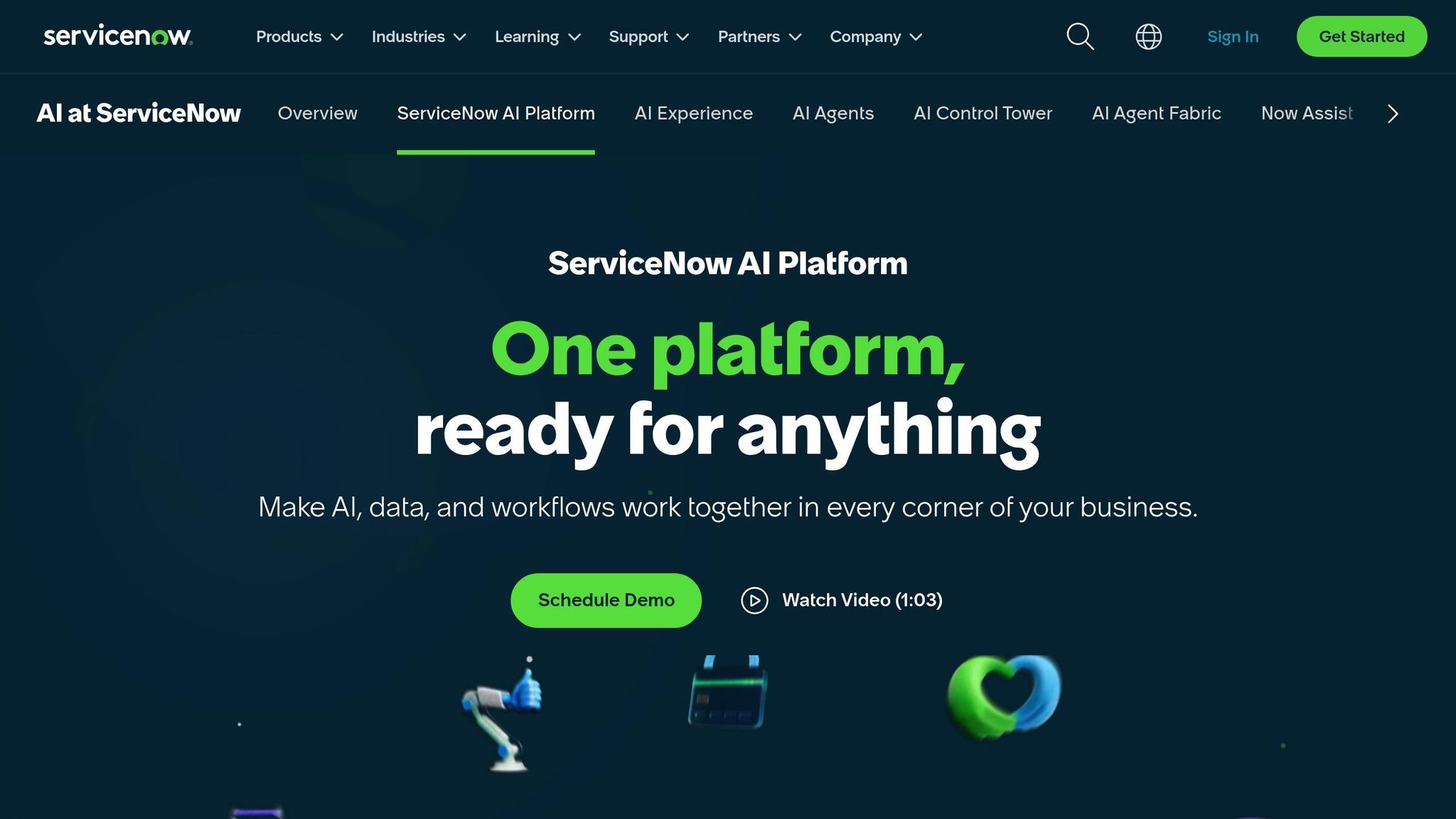
The ServiceNow AI Platform simplifies essential service delivery tasks through the use of predictive analytics and machine learning. It’s designed to improve operational efficiency and support better decision-making across various enterprise scenarios.
In IT Service Management (ITSM), the platform automates processes like incident handling, problem resolution, and change management. For Customer Service Management (CSM), it streamlines service requests and resolutions, ensuring faster and more efficient outcomes. Additionally, its Virtual Agents provide conversational support and help manage workflows, significantly reducing the need for manual effort.
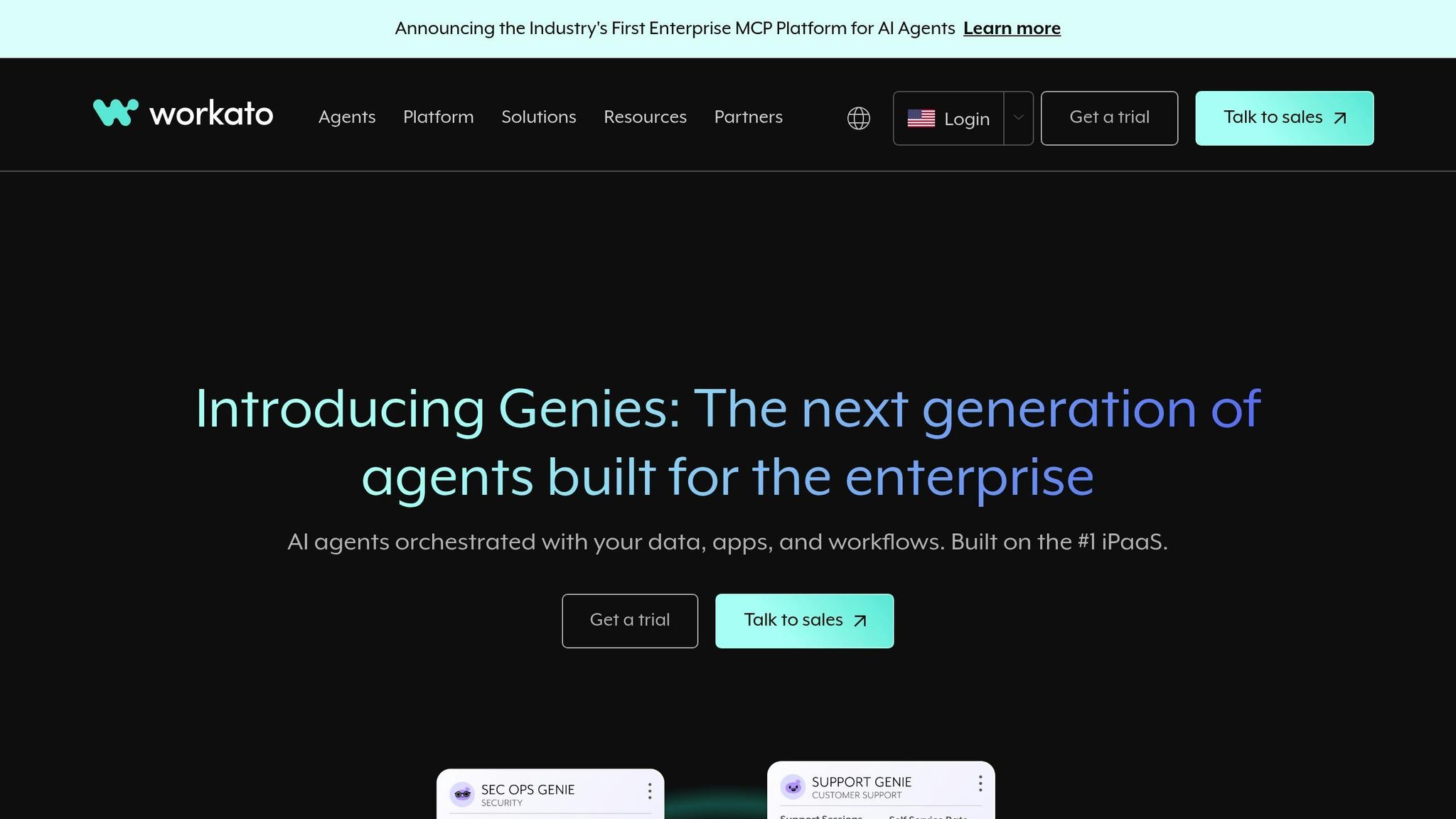
Workato stands out as a powerful tool in the realm of AI-driven automation, particularly for businesses aiming to simplify and optimize their workflow integrations. This enterprise automation platform is designed to connect various applications seamlessly, enabling companies to automate intricate processes across multiple systems - all without requiring deep technical knowledge.
One of Workato's key strengths lies in its low-code connectors, which make it easier for both technical teams and non-technical users to create and deploy automated workflows. By reducing the need for manual intervention, the platform helps businesses save time and focus on more strategic tasks.
Although specific details about pricing and technical specifications are not extensively available, Workato is widely recognized for its effectiveness in integrating enterprise applications and streamlining operations. For those interested in exploring its full capabilities, Workato's official documentation offers additional insights. Alongside other platforms we've discussed, Workato provides businesses with yet another way to enhance productivity and scale their AI automation efforts.
This analysis brings together the key advantages and drawbacks of the enterprise AI solutions discussed earlier, offering a clear perspective for decision-makers.
Pricing Models: Many modern platforms are moving toward flexible, usage-based pricing instead of locking users into costly, long-term contracts. For instance, platforms like Prompts.ai adopt pay-as-you-go models, which tie expenses directly to actual usage. This approach offers businesses better control over their budgets and helps avoid unnecessary spending.
Security and Compliance: Security remains a top priority across all platforms reviewed. Most solutions include features like governance frameworks, audit trails, and compliance tools to ensure data protection and meet regulatory requirements. These safeguards are designed to be adaptable, catering to the unique needs of different organizations.
Integration Capabilities: Integration strategies differ widely. Some platforms provide a unified interface for accessing multiple AI models, streamlining workflows, while others emphasize compatibility with existing enterprise systems. The best options reduce tool sprawl and simplify implementation, making them easier to adopt across various teams.
Business Application Scope: Platforms also vary in their industry focus and how well they support different use cases. Factors like the range of supported applications, availability of training materials, and active user communities play a significant role. Businesses gain the most value from solutions that align directly with their goals and provide resources to maximize platform utility.
This comparative breakdown equips decision-makers with the insights needed to match platform capabilities to their business strategies effectively.
The comparisons outlined above highlight the importance of selecting AI solutions that grow alongside your business and integrate smoothly into your existing operations. It's essential to prioritize an AI platform that aligns with your business goals, offering both scalable performance to handle expanding data needs and effortless integration with your current systems.
A truly scalable AI platform can manage increasing data volumes and complexity without sacrificing performance as your demands evolve. At the same time, seamless integration reduces disruptions and simplifies workflows, helping your team stay efficient. Together, these features ensure your AI investment continues to deliver value over time.
Take the time to assess your current infrastructure and anticipate future requirements to find an AI platform that supports your growth and positions your business for long-term success.
Prompts.ai adheres to strict SOC 2 Type II and GDPR standards, prioritizing the security and compliance of your data. To uphold these high standards, the platform utilizes trusted tools like Vanta for continuous monitoring of security controls, ensuring robust data protection practices.
On June 19, 2025, Prompts.ai began its SOC 2 Type II audit process, showcasing its dedication to achieving and maintaining top-tier security and compliance. These efforts provide enterprises with the confidence that their sensitive information is safeguarded while meeting critical industry requirements.
When choosing an AI platform, businesses need to weigh several important factors to ensure it aligns with their objectives and industry standards. Scalability should be a top priority - the platform must be capable of managing increasing data volumes and expanding workloads without disruption. Equally important is evaluating its data governance features to confirm it meets regulatory requirements and securely manages sensitive data.
Another key consideration is selecting a platform that’s built to evolve, offering the flexibility to adapt to new technologies and shifting business demands. Addressing the skills gap is also essential - opt for a platform with intuitive tools or robust support that empowers your team to make the most of the technology. Finally, the platform should clearly demonstrate a strong return on investment (ROI) by driving tangible improvements in areas like efficiency, decision-making, or innovation.
Usage-based pricing allows businesses to pay solely for the services they consume, eliminating the need for fixed costs typical of subscription models. This structure provides the flexibility to adjust spending as usage increases or decreases, aligning expenses with real needs.
For companies, this means more efficient cost management, minimized waste, and the opportunity to allocate resources with greater precision. It’s particularly advantageous for organizations with changing demands or those aiming to manage budgets effectively while maintaining access to crucial tools and technologies.


